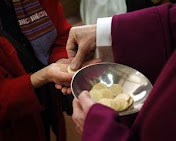On Communion Under One Species
Question: Father, why can’t lay people take consecrated wine (at least in the Roman Church)? Lutheran heretics accuse the Holy Mother Church of breaking away from Apostolic Tradition because She does not allow Roman laities to take consecrated wine. How do Catholic theologians refute this false claim?
Reply:
Thank you, Sir, for your question.
KEY POINTS:
Reasons for the discipline of communion under one species for the faithful:
To stress the Catholic doctrine of the Real Presence under either species against the wrangling of heretics.
There is no divine precept imposing Communion under both kinds for the faithful.
The Church has the discretional power over everything connected with the Sacraments that is not divinely determined.
Thus, for practical purposes, She prudently determined the two fold purpose of [a] safeguarding the reverence due to this August Sacrament, and [b] facilitating and encouraging it frequent and fervent reception.
The present discipline best secures these ends.
The Roman Catechism [Catechism of the Council of Trent] explains thus on “WHY THE CELEBRANT ALONE RECEIVES UNDER BOTH SPECIES”:
“It is clear that the Church was influenced by numerous and most cogent reasons, not only to approve, but also to confirm by authority of its decree, the general practice of communicating under one species. In the first place, the greatest caution was necessary to avoid spilling the blood of the Lord on the ground, a thing that seemed not easily to be avoided, if the chalice were administered in a large assemblage of the people.
In the next place, whereas the Holy Eucharist ought to in readiness for the sick, it was very much to be apprehended, were the species of the wine to remain too long unconsumed, that it might turn acid.
Besides, there are many who cannot at all bear the taste or even the smell of wine. Lest, therefore, what is intended for spiritual health should prove hurtful to the health of the body, it has been most prudently provided by the Church that is should be administered to the people under the species of bread only.
We may also further observe that in many countries wine is extremely scarce; nor can it, moreover, be brought from elsewhere without incurring very heavy expenses and encountering very tedious and difficult journeys.
Finally, a most important reason was the necessity of opposing the heresy of those who denied that Christ, whole and entire, is contained under either species, and asserted that the body is contained under the species of bread without blood, and the blood under the species of wine without the body. In order, therefore, to place more clearly before the eyes of all the truth of the Catholic faith, Communion under one kind, that is, under the species of bread, was most wisely introduced”
Meanwhile, St. Thomas Aquinas explained as follows:
“Two points should be observed regarding the use of this sacrament, one on the part of the sacrament, the other on the part of the recipients; on the part of the sacrament it is proper for both the body and the blood to be received, since the perfection of the sacrament lies in both, and consequently, since it is the priest's duty both to consecrate and finish the sacrament, he ought on no account to receive Christ's body without the blood.
But on the part of the recipient the greatest reverence and caution are called for, lest anything happen which is unworthy of so great a mystery. Now this could especially happen in receiving the blood, for, if incautiously handled, it might easily be spilt. And because the multitude of the Christian people increased, in which there are old, young, and children, some of whom have not enough discretion to observe due caution in using this sacrament, on that account it is a prudent custom in some churches for the blood not to be offered to the reception of the people, but to be received by the priest alone.
Furthermore, replying to an objection he says:
“Our Lord's Passion is represented in the very consecration of this sacrament, in which the body ought not to be consecrated without the blood. But the body can be received by the people without the blood: nor is this detrimental to the sacrament. Because the priest both offers and consumes the blood on behalf of all; and Christ is fully contained under either species…” [ST. TP. Q80, art.12; rep.3]
Noteworthy is that, Lutherans, breaking away from the Apostolic Traditional faith of the Mass being a true propitiatory sacrifice, regarding it merely to be a meal gathering [where you eat and drink -with your own hands] and having their belly for their god [Phil. 3:19], have no sense of Apostolic reverence for the Real Presence.
Meanwhile, Modernists -[Protestants within the walls of the Catholic Church]; making an alliance with Lutherans and other Protestants outside the walls, on the grounds of 'ecumenical endeavors'; since the concoction of the ecumenical mess falsely called the 'New order of Mass' or the 'Ordinary form of the Roman Rite', promote Lutheran meal assembly-theology...
 |
| Modernist Antipope 'Paul VI' with the Protestant ministers who helped in the concoction of the ecumenical mess falsely called the 'New Order of Mass'. |
 |
| Protestant/Modernist impious and sacrilegious meal assembly-theology in action... |



Thank you very much Father this information is very helpful.
ReplyDelete